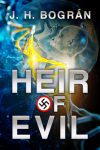March 16 – 22: “How do you distance yourself from the characters you write?”
 How do you distance yourself from the characters you write? Or do you? Roll up your sleeves, wash your hands, and join ITW members Arthur Kerns, Maria DiRico, Tessa Wegert, J. H. Bográn and Basil Sands. Scroll down to the “comments” section to follow along. You won’t want to miss it!
How do you distance yourself from the characters you write? Or do you? Roll up your sleeves, wash your hands, and join ITW members Arthur Kerns, Maria DiRico, Tessa Wegert, J. H. Bográn and Basil Sands. Scroll down to the “comments” section to follow along. You won’t want to miss it!
 Arthur Kerns is a retired FBI supervisory special agent with a career in counterintelligence and counterterrorism. A past president of the Arizona chapter of the Association of Former Intelligence Officers (AFIO) his award-winning short fiction has appeared in numerous anthologies. Diversion Books, Inc. NY published his espionage trilogy, The Riviera Contract, The African Contract and The Yemen Contract. His new novel, Days of the Hunters, was released in 2020.
Arthur Kerns is a retired FBI supervisory special agent with a career in counterintelligence and counterterrorism. A past president of the Arizona chapter of the Association of Former Intelligence Officers (AFIO) his award-winning short fiction has appeared in numerous anthologies. Diversion Books, Inc. NY published his espionage trilogy, The Riviera Contract, The African Contract and The Yemen Contract. His new novel, Days of the Hunters, was released in 2020.
 Maria DiRico (the pen name of award-winning author Ellen Byron) was born in Queens, New York, and raised in Queens and Westchester County. She is first-generation Italian American on her mother’s side. On her father’s side, her grandfather was a low-level Jewish mobster who disappeared in 1933 under mysterious circumstances. While growing up in Queens, Maria/Ellen’s cousins ran the Astoria Manor and Grand Bay Marina catering halls. Mardi Gras Murder, the fourth book in Ellen Byron’s bestselling Cajun Country Mystery series, won the 2018 Agatha Award for Best Contemporary Novel.
Maria DiRico (the pen name of award-winning author Ellen Byron) was born in Queens, New York, and raised in Queens and Westchester County. She is first-generation Italian American on her mother’s side. On her father’s side, her grandfather was a low-level Jewish mobster who disappeared in 1933 under mysterious circumstances. While growing up in Queens, Maria/Ellen’s cousins ran the Astoria Manor and Grand Bay Marina catering halls. Mardi Gras Murder, the fourth book in Ellen Byron’s bestselling Cajun Country Mystery series, won the 2018 Agatha Award for Best Contemporary Novel.
 Basil Sands is the author of action packed thrillers, novellas, and short stories and a professional audiobook narrator. Born on a homestead outside of Fairbanks Alaska, he served in the Marines, was Chef to the Spies (dining manager at the NSA), owned a computer shop, worked as a lumberjack, ambulance driver, radio host, and government IT guy. He’s married to a Porsche driving Korean woman, and has three grown sons and a Yorkie named Heimdall, The Norse Dog.
Basil Sands is the author of action packed thrillers, novellas, and short stories and a professional audiobook narrator. Born on a homestead outside of Fairbanks Alaska, he served in the Marines, was Chef to the Spies (dining manager at the NSA), owned a computer shop, worked as a lumberjack, ambulance driver, radio host, and government IT guy. He’s married to a Porsche driving Korean woman, and has three grown sons and a Yorkie named Heimdall, The Norse Dog.
 Tessa Wegert is a freelance writer whose work has appeared in Forbes, The Huffington Post, Adweek, and The Economist. She grew up in Quebec near the border of Vermont and now lives with her family in Connecticut. Tessa writes mysteries set in Upstate New York while studying martial arts and dance. DEATH IN THE FAMILY is her first novel.
Tessa Wegert is a freelance writer whose work has appeared in Forbes, The Huffington Post, Adweek, and The Economist. She grew up in Quebec near the border of Vermont and now lives with her family in Connecticut. Tessa writes mysteries set in Upstate New York while studying martial arts and dance. DEATH IN THE FAMILY is her first novel.
 J. H. Bográn is an international author of novels, short stories and scripts for television and film. He’s the son of a journalist, but ironically prefers to write fiction rather than facts. His genre of choice is thrillers, but he likes to throw in a twist of romance into the mix. He currently divides his time as resource development manager for Habitat for Humanity Honduras, teaching classes at a local university, and writing his next project. He lives in San Pedro Sula, Honduras with his wife, three sons and a “Lucky” dog. His motto is “I never tell lies, I only write them!”
J. H. Bográn is an international author of novels, short stories and scripts for television and film. He’s the son of a journalist, but ironically prefers to write fiction rather than facts. His genre of choice is thrillers, but he likes to throw in a twist of romance into the mix. He currently divides his time as resource development manager for Habitat for Humanity Honduras, teaching classes at a local university, and writing his next project. He lives in San Pedro Sula, Honduras with his wife, three sons and a “Lucky” dog. His motto is “I never tell lies, I only write them!”
- LAST GIRL MISSING with K.L. Murphy - July 25, 2024
- CHILD OF DUST with Yigal Zur - July 25, 2024
- THE RAVENWOOD CONSPIRACY with Michael Siverling - July 19, 2024
